The Disenchanted Blu-ray Movie
HomeThe Disenchanted Blu-ray Movie 
La désenchantéeCohen Media Group | 1990 | 78 min | Not rated | No Release Date
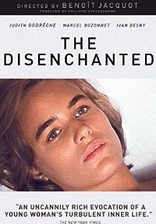
Price
Movie rating
6.9 | / 10 |
Blu-ray rating
| Users | 0.0 | |
| Reviewer | 3.5 | |
| Overall | 3.5 |
Overview
The Disenchanted (1990)
Starring: Judith Godrèche, Ivan DesnyDirector: Benoît Jacquot
| Foreign | Uncertain |
| Drama | Uncertain |
Specifications
Video
Video codec: MPEG-4 AVC
Video resolution: 1080p
Aspect ratio: 1.85:1
Original aspect ratio: 1.85:1
Audio
French: LPCM 2.0
Subtitles
English
Discs
25GB Blu-ray Disc
Single disc (1 BD)
Playback
Region A (B, C untested)
Review
Rating summary
| Movie | 3.5 | |
| Video | 4.0 | |
| Audio | 4.0 | |
| Extras | 2.5 | |
| Overall | 3.5 |
The Disenchanted Blu-ray Movie Review
Reviewed by Jeffrey Kauffman October 28, 2015Note: This film is available as part of
The Benoit Jacquot Collection.
La Nouvelle Vague, the French New Wave, is a perhaps singular movement in the history of film, even if many of its supposed
proponents would argue about whether there was an “official” movement at all. It’s hard to think of another example of a group of
filmmakers crafting a series of films that revolutionized both content and (probably especially) form so viscerally as did iconoclasts like
François Truffaut and Jean-Luc Godard (and what’s really frightening is that these two titans, along with others in the New Wave
whatever it was, were critics to begin with—yikes!) Maybe the Abstract Expressionists, or even the Americans who would
later be identified (ironically by the French) as film noir adherents, could be afforded this same radical status, but the New Wave was
so revolutionary and trendsetting that it seems to stand alone, a monolithic presence not just in its native country, but in the entire
annals of cinema. That said, the fact that the New Wave looms so large in France’s history may have led to certain categorization issues for
some French filmmakers who followed in the wake of the Wave, including Benoît Jacquot, a man whose birthyear of 1947 was only one year
before The Birth of a New Avant-Garde: The Camera-Stylo, one of the first critical analyses that gave birth to the New Wave, was
published. That ostensibly should place Jacquot at least partially in a post-New Wave generation, since many of the movement’s most iconic
films came out in either the late fifties or early sixties (e.g., Paris Belongs to Us, The 400 Blows, Breathless
, Shoot the Piano Player), while Jacquot himself didn’t
really get started helming feature films until the seventies. However, Jacquot’s early career included an extended apprenticeship under one
of the more lustrous (if sadly lesser known) names from the New Wave, Marguerite Duras, a director in her own right who is nonetheless
probably best remembered for having written Resnais’ classic Hiroshima mon amour. Perhaps due to that connection, as well as to some almost ineffable elements that waft
through Jacquot’s films at times, some folks have tried pigeonholing him as a New Wave phenomenon, but Jacquot, while anarchic in his own
deliberate way, is more of a formalist than some might typically associate with New Wave sensibilities, and he has in fact even mounted the
same kind of historical epic (Farewell, My Queen)
that was a particular thorn in the sides of some of the postulants populating the pages of Cahiers du Cinéma back in the day. (It
should be noted that Jacquot’s “take” on the historical epic is typically insouciant at times, perhaps indicative of the fact that he probably
read some of the barbs aimed at this genre by some of the 1950s French critics.) Jacquot has been curiously underserved on Blu-ray, with
only 3 Hearts appearing in addition to the aforementioned
Marie Antoinette drama domestically on disc, but Cohen Film Collection is ameliorating that issue with a new release that collects three of
Jacquot’s 1990s efforts together.
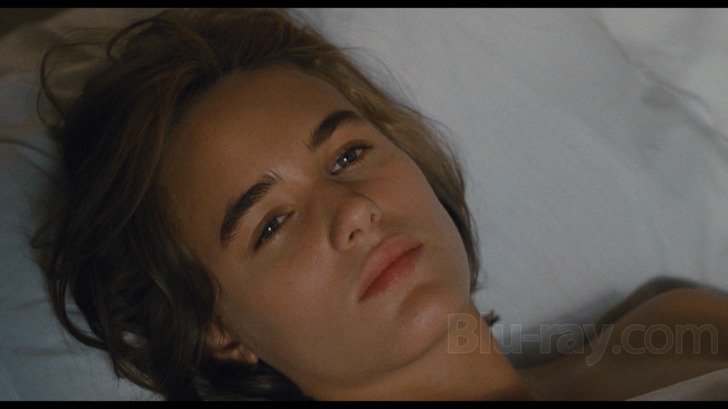
La désenchantée hails from 1990 and is the earliest of the three films including in the new set from Cohen. Almost intentionally slight in affect if not in actual impact, The Disenchanted traffics in a peculiar niche within French literary circles (e.g., Colette) that explores the changes in French adolescent females. The film is marked by a fairly languid pace where the miniscule assumes undue import, in what in a way is a perfect reflection of the way people like 17 year old Bêth (Judith Godrèche) tend to look at the world.
Bêth is between an emotional rock and a hard place, weirdly dismissed by her lackluster boyfriend (Malcolm Conrath, whose character is only euphemistically billed as l’autre, i.e. “the other”, and who is called “what’s his name”), who urges the gorgeous young woman to bed the ugliest man she can—in order to prove her love for the boyfriend. As if that weren’t angst producing enough, Bêth is almost by default in charge of her aging mother (Thérèse Liotard), a “working woman” far past her prime. Because Mom is ill and no longer able to work, the fate of Bêth’s little brother Remi (Thomas Salsman) is also up in the air, adding to the young girl’s emotional upheaval.
Bêth is presented with certain “opportunities”, including an especially troubling one at the hands of her mother, who wants Bêth to assume the mother’s former duties with the aptly named “Sugardad” (Ivan Desny, just as troublingly credited as l'oncle, i.e. the uncle). While selling herself to support her family might seem like Jacquot is presenting the character with a no win situation, perhaps surprisingly The Disenchanted doesn’t shirk from Bêth’s own coquettish qualities, as evidenced by at least a couple of other males (one young, one older) with whom she takes up (not necessarily sexually).
While there is no denying the organic evolution of Bêth’s awakening(s) in the film, The Disenchanted is less about huge plot arcs and more about the quiet observations that Jacquot affords the viewer, many of which are communicated through the doleful and incredibly expressive eyes of Judith Godrèche. The character is perhaps somewhat detached from events in what may amount to something of a defense mechanism, and that may account for some of the distance some viewers may feel from the subject, no matter how heart rending it is at a baseline level. Ironically, that intellectualized approach may remind some historically minded cineastes of, yes, the New Wave.
The Disenchanted Blu-ray Movie, Video Quality 
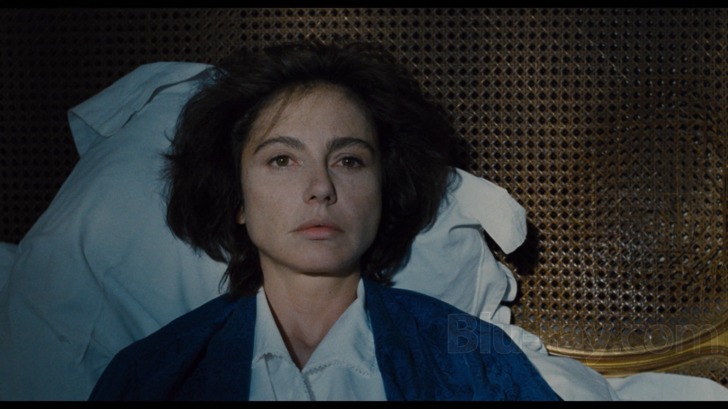
The Disenchanted is presented on Blu-ray courtesy of Cohen Film Collection with an AVC encoded 1080p transfer in 1.85:1. All three films
in the The Benoit Jacquot Collection have
been sourced from new 2K restorations, and all three offer elements that are virtually damage free in terms of nicks, scratches or other similar
issues. Jacquot does not really exploit any visual "wow" moments in The Disenchanted, with a fairly tamped down palette on display, and
in fact there's a kind of dark, dowdy ambience a lot of the time, especially with regard to some of the squalid living conditions Bêth and her family
experience. This is the grainiest presentation of the three films in the set, but despite the fairly heavy textures on display, everything resolves
very naturally and features a very organic looking appearance. Detail is very good, especially in close-ups. There's a slight yellowish tinge in
some interior scenes that tends to smooth levels of detail.
Three additional screenshots in positions 1-3 are available in The Benoit Jacquot Collection Blu-ray review.
The Disenchanted Blu-ray Movie, Audio Quality 
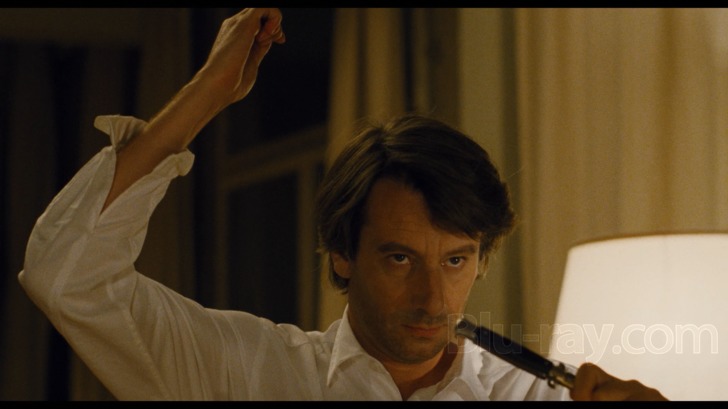
The Disenchanted features an LPCM 2.0 track in the original French. As with all three films in The Benoit Jacquot Collection, The Disenchanted offers a fairly restrained sound design, one which offers a lot of dialogue scenes between two characters at a time, but a relative paucity of ambient environmental sounds, at least in the many interior sequences. Fidelity is fine throughout the presentation, and there are no problems of any kind to warrant concern.
The Disenchanted Blu-ray Movie, Special Features and Extras 
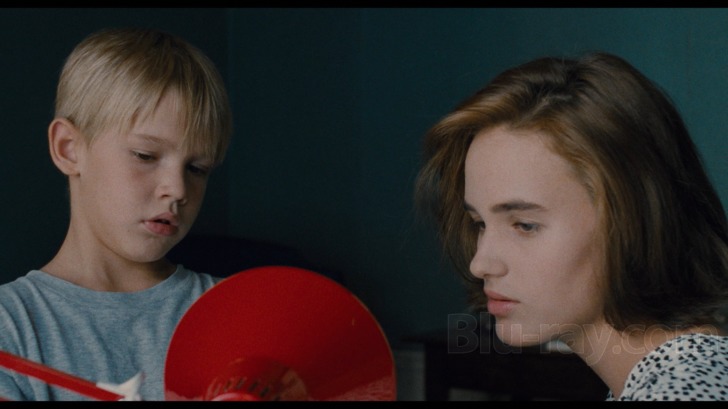
- Feature Length Audio Commentary by Film Critics Wade Major and Tim Cogshell. Major and Cogshell both "hail" from KPCC and offer an excellent and informative commentary dealing with everything from where this film sits within Jacquot's overall oeuvre as well as elements like the director's aptitude for working with young women.
- New Video Interview with Director Benoit Jacquot (1080p; 18:35) is hosted by the New York Film Festival's Kent Jones, who lapses in and out of French (with subtitles). Jacquot discusses how he "reinvented" himself with this film, and how much he feels he owes Godrèche.
- Original Theatrical Trailer (1080p; 1:18)
- 2015 Re-release Trailer (1080p; 1:36)
The Disenchanted Blu-ray Movie, Overall Score and Recommendation 
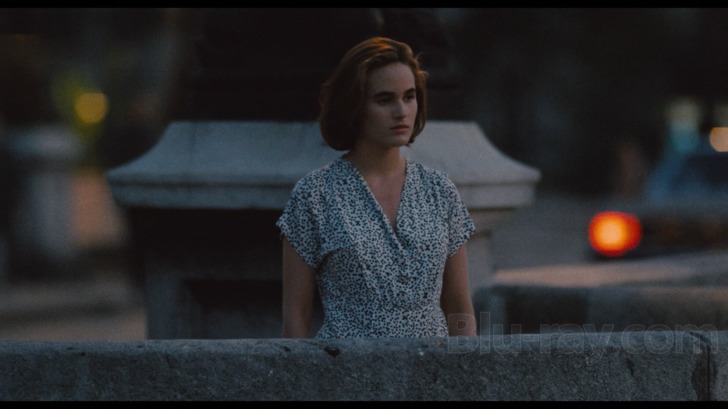
Despite the somewhat smarmy subtext of the film, The Disenchanted is surprisingly smart, even if some elements like its references to Rimbaud may strike some as overly pretentious. The film relies on Godrèche's incredibly expressive eyes throughout a somewhat uncomfortable series of unfortunate events. While The Disenchanted may weirdly forsake going for the gusto in the emotional arena, the film is compelling and tonally fascinating. Technical merits are generally very strong and The Disenchanted comes Recommended.
Similar titles
Similar titles you might also like
(Still not reliable for this title)

Elles
2011

Young & Beautiful
Jeune et jolie / Slipcover in Original Pressing
2013

The Life of Oharu
西鶴一代女 / Saikaku ichidai onna
1952

The Marriage of Maria Braun
Die Ehe der Maria Braun
1978

Double Suicide
心中天網島 / Shinjû: Ten no Amijima
1969

Jeanne Dielman, 23, quai du Commerce, 1080 Bruxelles
1975

Diary of a Lost Girl
Tagebuch einer Verlorenen
1929

Murmur of the Heart
Le souffle au coeur
1971

The Ballad of Narayama
Narayama bushikô
1983

When a Woman Ascends the Stairs
女が階段を上る時 / Onna ga kaidan wo agaru toki
1960

Mamma Roma
1962

Raise the Red Lantern
Da hong deng long gao gao gua
1991

The Image Book
Le livre d'image
2018

The Merchant of Four Seasons
Händler der vier Jahreszeiten
1971

La Chienne
The Bitch
1931

Street of Shame
Akasen Chitai
1956

India Song
1975

Accattone
1961

The Insect Woman
にっぽん昆虫記 / Nippon konchûki
1963

Irezumi
1966